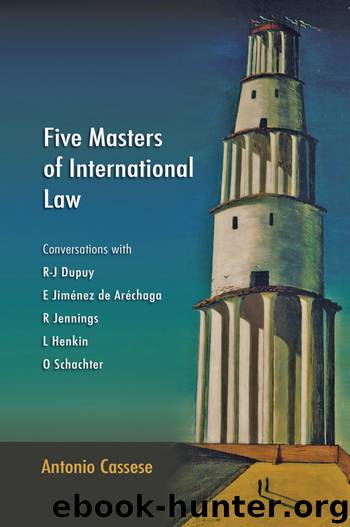Five Masters of International Law by Cassese Antonio

Author:Cassese, Antonio.
Language: eng
Format: epub
ISBN: 9781849461207
Publisher: Bloomsbury UK
B. Adjudication versus political machinery for change
I sometimes feel that academics, professors of international law, are a bit too much in love with litigation. It stems from Hersch Lauterpacht’s time, when I was under his influence very much: it was very important indeed if any case came to the PCIJ or the ICJ. And then of course one was very concerned that it should help develop international law, because so much of it needed development and elaboration; it got this piecemeal development depending upon a case arising in one particular corner. I am reminded again of something McNair once said, that he was very impressed with the way sometimes you read a passage in a book, or even in a case, which seems to be the essence of legal wisdom, and then you get an actual concrete case on the matter and you find it doesn’t help you very much because it just doesn’t address at all the particular case. I think that has long been a weakness of international law: there’s a bit too much of the essence of wisdom, but not enough experience. For that reason litigation was in the early days obviously very important indeed, especially before the World Court.
At the same time I think one must recognise that international law is singularly lacking in developed, adult, grown-up machinery for international political decision. You get international conferences and so on, and diplomatic conferences, you have the Secretary-General and the Security Council with its limits, you have General Assembly resolutions. But it’s inadequate compared with the machinery you would find in any State for executive and administrative political decision, legislation and so on. I feel that this has an impact on the International Court of Justice. A municipal court would find life difficult in that sort of context. The Court survives partly, I feel, because essentially jurisdiction is consensual. Therefore I have hesitations about the sort of monocular drive for compulsory jurisdiction that academics have always backed, with its objections to reservations to declarations under Article 32 and so on. The difficulties that arise from this drive were to some extent faced in the inter-war period under the heading of ‘the need for peaceful machinery for change in the law’. I remember some essay of Lauterpacht’s, given I think when he was at the London School of Economics, saying that unless we are very careful, an international tribunal under the present system will be administering injustice, because there is no proper machinery for changing the law other than war (which was still legal, and was the normal method, after all, of changing the law radically). After a peace treaty, things could change completely.
We’ve now made war and the use of force illegal, but again we haven’t quite put adequate machinery in place for making changes by other means. This is not an easy climate for a world court. I feel there is a whole area here that needs investigation. There’s an interesting article of Brownlie’s105 pointing out that
Download
This site does not store any files on its server. We only index and link to content provided by other sites. Please contact the content providers to delete copyright contents if any and email us, we'll remove relevant links or contents immediately.
The Pirates of Somalia by Jay Bahadur(1623)
Political Theology by Carl Schmitt(1577)
The Holocaust: A New History by Laurence Rees(1521)
The Social Animal by David Brooks(1452)
A Practical Guide to International Arbitration in London by Hilary Heilbron(1434)
Restitution by Restitution(1424)
Pirates of Somalia by Jay Bahadur(1381)
Coercing Virtue by Robert H. Bork(1357)
The Nuremberg Interviews by Leon Goldensohn(1304)
Basic International Corporate Taxation by Sebastiano Garufi(1214)
A History Of Thailand by Baker Chris(1190)
International Trade and Business: Law, Policy and Ethics by Gabriël Moens & Peter Gillies(1137)
The Global Commons by Susan J. Buck(1137)
The Sovereignty of Human Rights by Macklem Patrick(1113)
Blood Profits by Vanessa Neumann(1113)
Asian Waters by Humphrey Hawksley(1113)
Spring Fever: The Illusion of Islamic Democracy by McCarthy Andrew C(1102)
The Nuremberg Trials: The Nazis and their Crimes Against Humanity by Roland Paul(1043)
Crimes Against Humanity: Historical Evolution and Contemporary Application by M. Cherif Bassiouni(1027)
